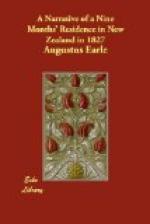All those chiefs who were under the operating hands of Aranghie, the tatooer, were under this law, and all those who worked upon their war canoes were similarly situated. Unfortunately for me, I one day took away a handful of chips from their dockyard to make our fire burn clearly. I was informed they were taboo’d, and upon my pleading ignorance, and sorrow for the misdemeanour, together with a promise not to renew the offence, I was pardoned. A poor hen of ours did not escape so well; she, poor thing, ventured to form a nest, and actually hatched a fine family of chickens amongst these sacred shavings! Loud was the outcry, and great the horror she occasioned when she marched forth cackling, with her merry brood around her. She and “all her little ones” were sacrificed instantly. What became of their bodies we could never learn; probably the workmen were not too fastidious to eat them.
I have observed, since my residence here, one circumstance which proves a kind feeling in the natives, and shows they are not averse to the preaching of the missionaries, or the doctrines they inculcate.
It was the custom of all the Europeans settled here, on the beach at Kororarika, to refrain from all kinds of work on the Sabbath; to shave, and dress themselves in their best habiliments; and if any of the missionaries came over, they went forth to meet them, and hear divine service. Several of the natives generally assembled and witnessed the ceremony; and as they observed it came every seventh day, they called it “the white taboo’d day, when the pakeha (or white men) put on clean clothes, and leave off work;” and, strange to say, the natives also abstained from working on that day. Nothing could induce them to the contrary; not that we wished to persuade them to work, but merely endeavoured so to do to ascertain the strength of their politeness. Not a bit of work would they do upon a Sunday, although it was a critical time with them; for all the chiefs were unprepared with their war canoes for the approaching expedition. At length we discovered that their cunning was as conspicuous as their politeness. They had observed we generally lay longer in bed on a Sunday morning than any other; they accordingly were up by break of day, and had completed many hours’ work before we made our appearance; but the moment one of us did appear the work was instantly left off. This degree of outward respect, though craftily managed, was infinitely more than could be reasonably expected from a rude and turbulent savage. It is mere respect than we Europeans pay to any religious ceremony we do not understand. Even their taboo’d grounds would not be so respected by us, if we were not quite certain they possessed the power instantly to revenge any affront offered to their sacred places.




